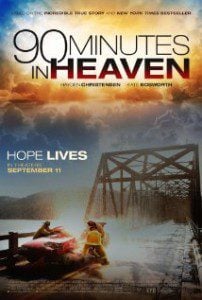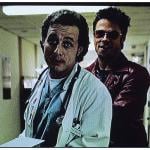90 Minutes in Heaven, released today, is reportedly the true story of a man who died and went through the proverbial pearly gates. Based on Don Piper’s own bestselling book of the same name, it’s admittedly not a great movie. But I did like how in spite of its title, it spent most of its time on earth—exploring the painful aftermath of Piper’s own incredible experiences. Once you see golden eternity, it seems, it’s tough to attach yourself back to that mortal coil.
“I don’t know that I want to make it,” Piper (played by Hayden Christensen) says in the movie.

‘Course, lots of Piper’s fellow Christians think he didn’t go to heaven at all. It’s strictly a one-way trip. Because as Piper suggests, once you get to heaven, it’s kind of unfair to have to leave again. (Especially when you’re earthly body is going to have to grow back four inches of leg bone.)
Heavenly tourism stories, be they books or movies, are big business. Piper’s book—one of the first in the genre—has sold 6 million copies. Heaven Is for Real (written by Todd Burpo and based on the stories of his then 3-year-old son, Colton) sold 10 million, and the movie made more than $100 million. Lots of Christians love these stories.
But Christianity, even evangelical Christianity, is not the monolithic construct that some make it out to be. And lots of Christians believe these stories are a big load of bunk.
It’s not that these doubters believe Piper and Burpo and all the rest are lying, exactly. But near-death experiences, by their nature, are pretty traumatic, and brains do some pretty strange things in the process. These Christians don’t believe that Jesus necessarily rides a rainbow-colored horse, as Colton said he did in Heaven Is for Real. They’re bothered that some afterlife accounts seem to contradict the Bible. Many believe that we’re not supposed to know about all those heavenly goings-on. Heaven’s supposed to be a surprise.
“Studying mystical accounts of supposed journeys into the afterlife yields nothing but confusion, contradiction, false hope, bad doctrine, and a host of similar evils,” writes John MacArthur for gty.org. Ironically, heavenly tourism might be the only subject that a fundamentalist Baptist and an atheist agree on.
 Last summer, The Southern Baptist Convention passed a resolution that reaffirmed the “sufficiency of biblical revelation over subjective experiential explanations to guide one’s understanding of the truth about heaven and hell.” This January, Alex Malarkey—the inspiration for The Boy Who Came Back From Heaven—recanted his own heavenly story and accused the whole genre of being made up.
Last summer, The Southern Baptist Convention passed a resolution that reaffirmed the “sufficiency of biblical revelation over subjective experiential explanations to guide one’s understanding of the truth about heaven and hell.” This January, Alex Malarkey—the inspiration for The Boy Who Came Back From Heaven—recanted his own heavenly story and accused the whole genre of being made up.
“When I made the claims that I did, I had never read the Bible,” he wrote to LifeWay Christian Retailers and other Christian booksellers. “People have profited from lies, and continue to. They should read the Bible, which is enough. The Bible is the only source of truth.”
And this spring, as Samuel Goldwyn Films was likely putting the finishing touches on the 90 Minutes in Heaven movie, LifeWay Christian Resources pulled the 90 Minutes books off its shelves, along with all the other heaven tourism books. Considering how well those books sell, it must’ve been a pretty big financial sacrifice.
Piper gets it. In the movie, he shows a great deal of reticence at first to talk about his experiences, and doesn’t mention them to anyone for months. But he later becomes convinced that God sent him back for just this purpose—to talk about heaven and to get people ready for their own trip to the afterlife.
His story and those like it remain extraordinarily popular and, for some, pretty convincing. While some scientists point to near-death experiences as just hallucinations brought about by the dying mind, others say there’s got to be something else at work here. They point to the similarities of the stories. The sheer numbers of people who report them. The very bizarre instances of apparently dead people seeing things they couldn’t possibly have seen. Take the story of a woman named Maria, who apparently went into cardiac arrest in a hospital. The day after doctors revived her, she told her critical care social worker, Kimberly Clark, that her consciousness had left her body when she was “dead” and floated out of the hospital where she had seen a tennis shoe on the roof. Writes Brian Bethune of Maclean’s:
Quite skeptical, Clark went where Maria sent her, and found the tennis shoe, just as she’d described it. “The only way she could have had such a perspective,” said Clark, “was if she had been floating right outside and at very close range to the tennis shoe.” It shouldn’t have been possible, as both [University of Montreal professor Mario] Beauregard and [Dr. Sam] Parnia point out. “The question becomes,” Parnia says, “how can people have conscious awareness when they’ve gone beyond the threshold of death?”
Neurosurgeon Ebon Alexander had his own near-death experience that he later chronicled in his book Proof of Heaven: A Neurosurgeon’s Journey into the Afterlife. Critics have taken issue with Alexander’s book, naturally, and Esquire dedicated some significant magazine real estate to debunking his claims. But Alexander stands by his story, and he asserts that death is merely a transition to a better, more real form of life.
 “My journey deep into coma, outside this lowly physical realm and into the loftiest dwelling place of the almighty Creator, revealed the indescribably immense chasm between our human knowledge and the awe-inspiring realm of God,” he wrote in his book.
“My journey deep into coma, outside this lowly physical realm and into the loftiest dwelling place of the almighty Creator, revealed the indescribably immense chasm between our human knowledge and the awe-inspiring realm of God,” he wrote in his book.
And maybe that’s the thing that intrigues me the most about these stories. While there are lots of similarities in near-death tales—the tunnel, the white light, the loved ones waiting for you—few things are as universal as the sense of hyper-reality these folks report—that, compared to what they experienced after death, life as we know it looks like a faded facsimile.
I had the opportunity to watch 90 Minutes in Heaven with Don Piper. And in a Q&A session he held afterward, Piper said that it’s his life now—even more than 25 years later—that feels like a dream. For him, reality lies after death. “It’s simply the most real thing that has happened to me,” he says.
It reminds me of C.S. Lewis’ The Last Battle, when seven one-time children enter their own Narnian heaven:
All their life in this world and all their adventures had only been the cover and the title page: now at last they were beginning Chapter One of the Great Story which no one on earth has read: which goes on for ever: in which every chapter is better than the one before.
Now, none of that is proof, of course. Skeptics will say that hallucinations can be plenty powerful, and I’m not completely convinced by the stories myself. But am I prepared to say that these near-death experiences absolutely aren’t real? No. Maybe, just maybe, Piper’s story and others are a little like movie trailers themselves—coming attractions, if you will.













